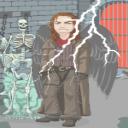Yahoo Answers is shutting down on May 4th, 2021 (Eastern Time) and beginning April 20th, 2021 (Eastern Time) the Yahoo Answers website will be in read-only mode. There will be no changes to other Yahoo properties or services, or your Yahoo account. You can find more information about the Yahoo Answers shutdown and how to download your data on this help page.
Trending News
Anglo-Saxons..?
Can you give me some facts on the Anglo-Saxons??
11 Answers
- Anonymous1 decade agoFavorite Answer
Anglo-Saxon is the term used to describe the ethnically and linguistically related peoples living in the south and east of the island of Great Britain from around the early 5th century AD to the Norman conquest of 1066.
They spoke closely related Germanic dialects. They were composed mostly of the three Germanic tribes, the Angles, Saxons, and Jutes. The Angles and the Jutes originated from the Jutland peninsula (modern-day Denmark), and the Saxons from the area later called Lower Saxony or Niedersachsen (modern-day northwest Germany).
Following the retreat of the Roman Legions from Britain in 410 AD, groups from these three Germanic tribes began emmigrating to the isle of Great Britain, gradually taking over most of present day England from the native Romano-Britons, who were driven into the peripheries of Great Britain (Scotland, Wales, and Cornwall).
The modern day name of England takes its name from the Angles. It is derived from "Angleland", or "Land of the Angles".
Hope this helps,
Peace!
- brother_in_magicLv 71 decade ago
It now looks, though both dna testing and recent archaeological finds, that the old 'Anglo saxon' wipeout theory is incorrect. They seem to have been a ruling aristocracy who imposed their culture and language on the natives whom they assimilated (another possibility is that 'celtic' tribes such as the belgae from Belgium spoke a Germanic language,not a celtic one. it is interesting to note that no inscibed stones in celtic have ever been found anywhere in iron Age England )
The majority of English (well over half) have pre-saxon ancestry which matches very well with the Irish,Welsh and Scots--the closest match in Europe for all British/Irish peoples are the basques of Spain. It would seem people immigrated from the Basque regions after the last Ice Age across what was then a land bridge to Britain/Ireland. This dna could also be used to argue that infact the 'celts' of Britain, are for the most part, not really celts at all--or rather, they are celtic by culture.
- Anonymous1 decade ago
Anglo-Saxons were migrants to England in the 5th century from various regions in northwest Germany (the lands of the Angles and of the Saxons)
They are first mentioned in an early 6th century text written by a welsh monk (Gildas). He describes how Germanic mercenaries were initially employed by British kings after the fall of the Roman Empire in the late 4th century. However, the mercenaries rebelled against their employers and this is supposedly how the Germanic occupation of England began. Gildas describes how the majority of the British people were slaughtered by these warlike migrants.
However, current archaeological debate suggests that the issue is not quite so clear cut as this, it is more likely to be a case of some Germanic (Anglo-Saxon) migration in the east of England, while the rest of the native British population was gradually assimilated into a predominantly Germanic kind of culture and society.
Source(s): Gildas: On the Ruin of Britain Bede: The Ecclesiastical History of the English People Martin Welch: The Anglo-Saxons Nick Higham: Rome, Britain and the Anglo-Saxons - 1 decade ago
There are a lot of good sources for learning about the Anglo-Saxons. Remember the library as well as the internet. The Anglo-Saxon invasion of Britain brought about many changes in the population and in government. Invaders to start with they eventually came to stay. I recommend the Anglo-Saxon Chronicles for great reading. It was a close thing whether an An go-Saxon or a Norman became king of England. Much of the language we speak today originated with the Anglo-Saxons. They are a fascinating piece of history in Britain. Of course, they were invaders, they plundered, murdered and pushed the original inhabitants to small areas of Britain. Wales and Cornwall were strongholds of the Britons. Enjoy learning about them, they are fascinating.
- How do you think about the answers? You can sign in to vote the answer.
- 1 decade ago
They originally came from what we call nowadays Germany, Denmark and north Holland. They arrived in England circa the 8th century. Jeremy Paxman makes the point in his book 'The English' that the first thing the English (i.e. Anglo-Saxons) did upon arriving in England was to start smashing things up.
We haven't changed much over the centuries!
Source(s): 5th century I mean. Getting muddled up with the Danes. Dumb*ss, eh? - Louise CLv 71 decade ago
The Anglo-Saxons started invading England in about the 5th century A.D. They quickly conquered most of England. England was divided into several small kingdoms ruled by different kings. The Anglo-Saxon kings were not absolute monarchs, the advisory council (the Witan) had the power to choose one member of a royal family rather than another if this seemed a better choice for the kingdom. Northumbria, mercia, Wessex and Kent were Saxon kingdoms, with Wessex gradually becoming the most powerful, with the king of Wessex being eventually recognised as Bretwalda, the ruler of Britain.
Saxon England was Pagan at first, but missionaries came from Rome to convert them, led by Augustine. They went first to Kent, where they were met by King Ethelbert, who was married to a Christian wife. They were provided with accomodation in Canterbury, where they built a church on the site that eventually became Canterbury Cathedral. By 634 the monk Aidan from Iona was preaching throuhgout Northumbria, whose King oswald had become a Christian during years of exile on the island. One of Aidan's disciples, St Chad, bore the gospel on through Mercia.
Many churches were built in England, some of which still survive (there is one in the grounds of Dover Castle for instance). Saxon monks and nuns produced some beautiful illuminated manuscripts. Monasteries were built in england, often they were double monasteries, communities of monks and nuns, usually under the rule of an Abbess(the chief nun) . In 663 the Synod of Whitby was held. with the Abbess Hilda presiding, to decide whether the English church should follow the roman or Celtic method of calculating when Easter should be celebrated. They decided to follow Rome. A brilliant book on this exciting period of English history is 'History of the English people' by Bede, written in the early 8th century, it is a thrilling story full of kings and queens and saint and miracles.
Anglo-Saxon England was disrupted by waves of Viking invaders during the 8th and 9th centuries, they caused appalling desturction, burning and pillaging and killing, and carrying people away to be slaves. From 835 onwards, the Danes were making regular sallies up the Thames, and soon they were also coming in through East Anglia. the Saxon kingdoms proved incapable of assembling a powerful enough communal force to stem the onslaught of the 'great heathen host' of 865. Northumbria fell, and from york the great army marched into Mercia, which made several attempts to buy them off before being finally overrun.
With eastern and middle England overrun, the viking turned thier attention to Wessex, whose King Ethelred marched to meet them. Ethelred's younger brother Alfred took charge and 'fought like a wild boar' and beat the Danes. When Ethelred died soon after Alfred was unanimously declared King. He was a devout young man, and realised that the survival of his beliefs depended on defeating the Danes. But an influx of settlers swelled the viking ranks, and Alfred was driven into hiding on the Isle of Athelney in Somerset. Slowly and stealthily he assembled an army and came out at last to defeat the Danes athte battle of Edgington on 878. He fought the Danes for many years, and until the treaty of 886 known as 'guthrum's Peacel defined the tboundary between the two kingdoms, the Saxons in the south and the Danes in the north. Alfred built a fleet to guard his coasts, and forts to watch over his land. So that men would not be away from their farms for too long,he latered the constitution to arrange a rota for periods of service. At the same time he took advantage of the peace, precarious though it was, to encourage the spread of learning and fine craftsmanship.
Source(s): 'Ecclesiastical History of the english people' by Bede The Anglo-Saxon Chronicle 'In Search of the Dark Ages' by Michael Wood 'the Anglo-Saxons' edited by James Campbell - Anonymous5 years ago
Iberians are associated with the Visigoths, although there were other Germanic tribes in Iberia as well, notably the Vandals, and Suebi. Many people in Spain are descendants of Celts, Romans, Greeks, or Arabs.
- Anonymous1 decade ago
They were my ancestors as i have blue eyes and fair hair, but when growing a beard it has a reddish tint.
apparently it all makes sense; me personally think it's quite humorous.
- Anonymous1 decade ago
Yeah of course I can. [sarcasm] I come on the internet and visit Yahoo Answers just so I can read your question and go and do some research on the Anglo Saxons. DO SOME RESEARCH YOURSELF AND STOP BEING SO LAZY!






